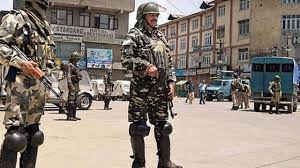Countering terror: On action against groups targeting civilians
All nations must come together against groups targeting civilians
External Affairs Minister S. Jaishankar’s listing of four hurdles to better counterterrorism cooperation, i.e., state support for financing terror; multilateral mechanisms that are opaque and agenda driven; double standards and politicisation of countering terrorism according to where terror groups belong, and the “next frontier ” (the use of emerging technologies such as drones and virtual currency by terrorists), needs attention. The focus of the UNSC special briefing on Thursday, ‘Global Counterterrorism Approach’, that was convened by India, is well-timed given that the “Global War on Terrorism” and the sanctions regimes launched after 9/11 are in disarray. In their haste to exit Afghanistan in 2021, for example, the UNSC’s permanent members, the U.S. and the U.K. struck the biggest blow to the sanctions regime by holding talks with the Taliban, easing their path to power in Kabul and letting their handlers in Pakistan off the hook. Second, as Mr. Jaishankar has pointed out, a P-5 country (China) continues to block the designations of Pakistan-based terrorists, including five named this year, from the LeT and the JeM. Finally, instead of uniting to accept India’s proposal, of 1996, of a Comprehensive Convention on International Terror to institute global practices on countering terror, the P-5 countries are hopelessly polarised, and irrevocably so, over Russia’s war in Ukraine. Given the scenario, New Delhi’s attempt at highlighting the issues during the last few weeks of its two-year UNSC tenure was apt, as it built up to the briefing with conferences in India including a UN Counter-Terrorism Committee meeting, the No Money For Terror conference, and an Interpol conference.
It is unfortunate, however, that the briefing appears to have been overshadowed by heated words outside the Council between Mr. Jaishankar and his Pakistani counterpart Bilawal Bhutto Zardari. In response to Mr. Jaishankar’s comments on Pakistan being the “ epicentre of terrorism”, Mr. Bhutto chose to launch a personal tirade against Prime Minister Narendra Modi and the 2002 Gujarat riots. That Pakistan’s “dossier” on what it claims is an Indian hand behind a blast in Lahore essentially pertains to an attack on the 26/11 terrorist strikes mastermind and LeT chief Hafiz Saeed is equally telling about the Pakistan government’s regard for him, as well as its desire to muddy the global narrative on terrorism. The Government would be better served by not taking the bait, and focusing instead on the task at hand : “ re-invigorating ” the global agenda and counter-terrorism architecture by emphasising the need for unity on the issue, and for all countries to provide resources to the battle against those driven by a radical ideology who continue to threaten civilian populations worldwide.
